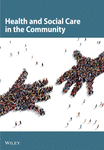Elderly people from ethnic minorities in Liverpool: mental illness, unmet need and barriers to service use
Abstract
The objective of the Health and Ethnicity Project was to identify unmet need and barriers to the use of psychogeriatric and welfare services by ethnic minority older people living in Liverpool's inner-city. The results presented here are the findings of Phase II of the project in which 71 ethnic minority older people aged 65 years and over were interviewed. These respondents had been diagnosed as suffering from dementia or depression earlier in Phase I. They include Black British, Afro Caribbean and Chinese older people. Findings show a low level of service use in spite of considerable unmet need. Only 8% were in institutions and 46% lived alone. For the 17% living alone in sheltered housing, there was evidence of violence towards wardens, wandering, neglect of rooms and occasional fires. Of the 27% living with a family nearly a half of cases also experienced physical disability. Those in institutions were finding language difficulties and problems in obtaining a suitable diet. Using Yeatts et al.'s typology (1992) ‘lack of knowledge’ barriers and ‘lack of intent’ barriers concerned the group as a whole most, i.e. they either did not know of services or perceived them as being culturally inappropriate. Implications for service providers are considerable: to ensure improved access it is necessary not only to invest more in general medical services but to work in partnership with ethnic minority groups to overcome barriers of mistrust and ensure cultural sensitivity in the services offered.




